
The Terror-of-the-Situation
In his epic historical novel All and Everything, Gurdjieff as Beelzebub laments to his grandson Hussein of a newly-formed-abnormal “hope in something” which paralyzes human possibility and results in the disease “tomorrow,” the “putting off until later everything that needs to be done at the moment.” — cf. Beelzebub’s Tales to His Grandson, Chapter XXVI: “The Terror-of-the-Situation”
Today, on the eve of what many hope will be a new beginning for America and the world, when a young political upstart named Barack Hussein Obama will enter America’s most public of public offices, while humanity is once again in terror of a situation of its own making, many of us are sincerely asking if there really is a yes-we-can-hope that is more than political slogan?
In the next to last paragraph of the last chapter of Beelzebub’s Tales, Gurdjieff acknowledges that there is still hope for humanity — but only if the beings of planet earth had a new organ of perception by which they were compelled to “constantly sense and be cognizant of the inevitability of their own death and the death of everyone on whom their eyes or attentions rests.”
We here at Bennett Books offer no quick solution to so great a challenge as humanity’s survival. Rather, in spite of such a challenge and in the light of it, we acknowledge our own experience in our own possibility and point you to a few of the books that have helped guide us toward what Gurdjieff calls a “hope of consciousness” that “is strength.”
Here’s a short list of books that helped us: Robert De Ropp’s The Master Game; PD Ouspensky’s Psychology of Man’s Possible Evolution and Tertium Organum; JG Bennett’s Witness and Hazard; GI Gurdjieff’s Beelzebub’s Tales; and Kathryn Hulme’s Undiscovered Country.


Don’t get lost in the sand. Don’t go with the flow. Don’t forget terror of the situation is not “out there” in events of the day, but, what happens if you let nature take her course with YOU. “BE” the one little brain cell that excapes that fate; awake.
Hahaha. I found this googling “the terror of the situation” to find some quotes for an essay about President trump. Your post here is beyond naive now.